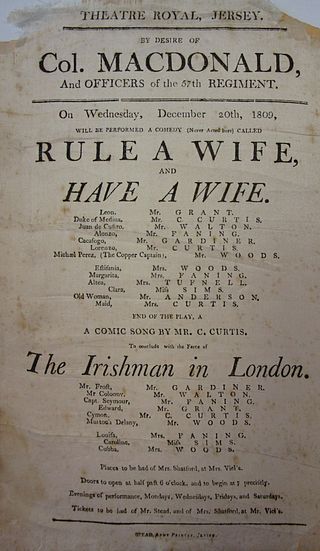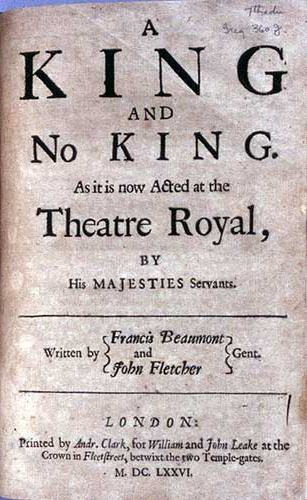Related Research Articles
Rollo Duke of Normandy, also known as The Bloody Brother, is a play written in collaboration by John Fletcher, Philip Massinger, Ben Jonson and George Chapman. The title character is the historical Viking duke of Normandy, Rollo. Scholars have disputed almost everything about the play; but it was probably written sometime in the 1612–24 era and later revised, perhaps in 1630 or after. In addition to the four writers cited above, the names of Nathan Field and Robert Daborne have been connected with the play by individual scholars.
The Birth of Merlin, or, The Child Hath Found his Father is a Jacobean play, probably written in whole or part by William Rowley. It was first performed in 1622 at the Curtain Theatre in Shoreditch. It contains a comic depiction of the birth of the fully grown Merlin to a country girl, and also features figures from Arthurian legend, including Uther Pendragon, Vortigern, and Aurelius Ambrosius.

Francis Beaumont was a dramatist in the English Renaissance theatre, most famous for his collaborations with John Fletcher.

Rule a Wife and Have a Wife is a late Jacobean stage comedy written by John Fletcher. It was first performed in 1624 and first published in 1640. It is a comedy with intrigue that tells the story of two couples that get married with false pretenses.

The Maid's Tragedy is a play by Francis Beaumont and John Fletcher. It was first published in 1619.

Parasitaster, or The Fawn is an early Jacobean play, written by the dramatist and satirist John Marston, probably in 1604, and performed by the Children of the Queen's Revels in the Blackfriars Theatre.
The Night Walker, or The Little Thief is an early seventeenth-century stage play, a comedy written by John Fletcher and later revised by his younger contemporary James Shirley. It was first published in 1640.
The Nice Valour, or The Passionate Madman is a Jacobean stage play of problematic date and authorship. Based on its inclusion in the two Beaumont and Fletcher folios of 1647 and 1679 and two citations in 17th-century sources, the play has long held a place in the canon of John Fletcher and his collaborators. Modern scholarship, however, has accumulated much internal evidence for the authorship of Thomas Middleton.
Cupid's Revenge is a Jacobean tragedy written by Francis Beaumont and John Fletcher. It was a popular success that influenced subsequent works by other authors.

Philaster, or Love Lies a-Bleeding is an early Jacobean era stage play, a tragicomedy written by Francis Beaumont and John Fletcher. One of the duo's earliest successes, the play helped to establish the trend for tragicomedy that was a powerful influence in early Stuart-era drama.
The Honest Man's Fortune is a Jacobean era stage play, a tragicomedy written by Nathan Field, John Fletcher, and Philip Massinger. It was apparently the earliest of the works produced by this trio of writers, the others being The Queen of Corinth and The Knight of Malta.
The Knight of Malta is a Jacobean era stage play, a tragicomedy in the canon of John Fletcher and his collaborators. It was initially published in the first Beaumont and Fletcher folio of 1647.
The Elder Brother is an early seventeenth-century English stage play, a comedy written by John Fletcher and Philip Massinger. Apparently dating from 1625, it may have been the last play Fletcher worked on before his August 1625 death.
The Wild Goose Chase is a late Jacobean stage play, a comedy written by John Fletcher, first performed in 1621. It is often classed among Fletcher's most effective and best-constructed plays; Edmund Gosse called it "one of the brightest and most coherent of Fletcher's comedies, a play which it is impossible to read and not be in a good humour." The drama's wit, sparkle, and urbanity anticipated and influenced the Restoration comedy of the later decades of the seventeenth century. The term "wild-goose chase" is first documented when used by Shakespeare in the early 1590s, but appears as a term with which his audience would be familiar, as there is no attempt to define its meaning.
Wit Without Money is a Jacobean era stage play, a comedy written by John Fletcher, and first published in 1639.
Love's Cure, or The Martial Maid is an early seventeenth-century stage play, a comedy in the canon of John Fletcher and his collaborators. First published in the Beaumont and Fletcher folio of 1647, it is the subject of broad dispute and uncertainty among scholars. In the words of Gerald Eades Bentley, "nearly everything about the play is in a state of confusion...."
Thierry and Theodoret is a Jacobean era stage play, a tragedy in the canon of John Fletcher and his collaborators that was first published in 1621. It is one of the problematic plays of Fletcher's oeuvre; as with Love's Cure, there are significant uncertainties about the date and authorship of Thierry and Theodoret.

A King and No King is a Jacobean era stage play, a tragicomedy written by Francis Beaumont and John Fletcher and first published in 1619. It has traditionally been among the most highly praised and popular works in the canon of Fletcher and his collaborators.
The Captain is the title of a Jacobean era stage play, a comedy written by Francis Beaumont and John Fletcher. It was originally published in the first Beaumont and Fletcher folio of 1647.

Monsieur Thomas is a Jacobean era stage play, a comedy written by John Fletcher that was first published in 1639.
References
- ↑ E. H. C. Oliphant, The Plays of Beaumont and Fletcher: An Attempt to Determine Their Respective Shares and the Shares of Others, New Haven, Yale University Press, 1927; p. 216.
- ↑ E. K. Chambers, The Elizabethan Stage, 4 Volumes, Oxford, Clarendon Press, 1923; Vol. 3, pp. 219-20.
- ↑ Quiller-Couch, A. The Oxford Book of English Verse: 1250-1900. Oxford: The Clarendon Press, 1901, rpt 1919. No. 207. "Q" attributes the poem to Fletcher.
- ↑ Hoy, Cyrus H. "The Shares of Fletcher and His Collaborators in the Beaumont and Fletcher Canon (III)." Studies in Bibliography. Vol. 11 (1958), p. 98. Part 3 of 7 parts: vols 8-9,11-15 (1956-62).
- ↑ Terence P. Logan and Denzell S. Smith, eds., The Later Jacobean and Caroline Dramatists: A Survey and Bibliography of Recent Studies in English Renaissance Drama, Lincoln, NE, University of Nebraska Press, 1978; pp. 54-5.
- ↑ Richard Levin, The Multiple Plot in English Renaissance Drama, Chicago, University of Chicago Press, 1971; pp. 151-4.
- ↑ Lee Bliss, "Beaumont and Fletcher," in: A Companion to Renaissance Drama, Arthur F. Kinney, ed., London, Blackwell, 2002; p. 526.
- ↑ "earshot, n." www.oed.com. Retrieved 20 October 2016.
- ↑ "'prostitute' Oxford English Dictionary". www.oed.com. Retrieved 20 October 2016.
- ↑ "'worm' Oxford English Dictionary". www.oed.com. Retrieved 20 October 2016.
- ↑ "'yelping' Oxford English Dictionary". www.oed.com. Retrieved 20 October 2016.
- ↑ "'yelping', Oxford English Dictionary". www.oed.com. Retrieved 20 October 2016.